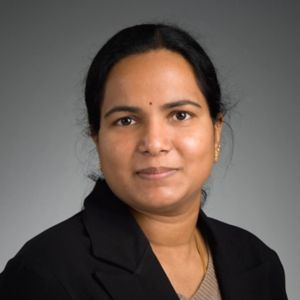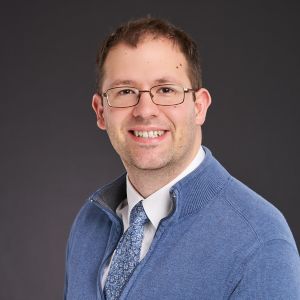St. Jude Family of Websites
Explore our cutting edge research, world-class patient care, career opportunities and more.
St. Jude Children's Research Hospital Home

- Fundraising
St. Jude Family of Websites
Explore our cutting edge research, world-class patient care, career opportunities and more.
St. Jude Children's Research Hospital Home

- Fundraising
5 Questions for Thirumala-Devi Kanneganti, PhD
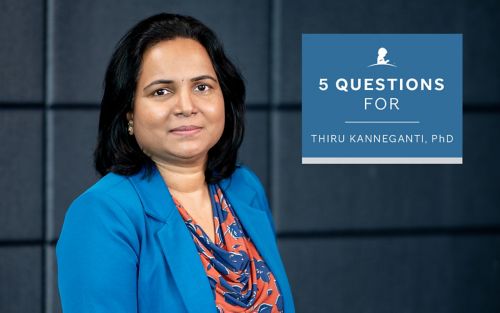
Thirumala-Devi Kanneganti, PhD, St. Jude Department of Immunology vice-chair and Center of Excellence for Innate Immunity and Inflammation director, studies innate immunity and inflammation.
This question-and-answer series explores the motivations, inspirations and accomplishments of investigators at St. Jude. Thirumala-Devi Kanneganti, PhD, is Vice-Chair of the St. Jude Department of Immunology and Director of the Center of Excellence for Innate Immunity and Inflammation. At St. Jude, she studies innate immunity and is a founding member of the field of inflammasome research.
Kanneganti is recognized as one of the most highly-cited scientists in the world. She is the recipient of numerous awards and honors, including being named a fellow of the American Association for the Advancement of Science and receiving the Seymour and Vivian Milstein Award from the International Cytokine and Interferon Society, which is considered the pinnacle of scientific achievement in cytokine and interferon research. Most recently, she was recognized with the 2024 American Association of Immunologists-Thermo Fisher Meritorious Career Award for exceptional research contributions to the field of immunology.
1. Why did you decide to become a scientist, and what questions intrigued you during your training?
My journey to becoming a scientist, specifically studying innate immunity and inflammation, followed a surprising path. As a child growing up in a small town in India, I was enthralled by microbes and how they cause disease. After completing my master’s in microbiology, I started working in a virology lab for my doctorate, studying plant viral and fungal diseases and their diagnosis and treatment. As a postdoctoral fellow, I continued working on plant innate immunity and cell death.
Plants are equipped with innate immune sensors called NOD-like receptor (NLRs) that induce cell death to defend against infection. When mammalian NLRs were discovered based on their structural similarity to plant NLRs, I saw an exciting opportunity to apply my knowledge from plant innate immunity and cell death. In 2006, our work provided the first genetic evidence for the role of the mammalian innate immune receptor NLRP3 in microbial-mediated inflammasome activation.
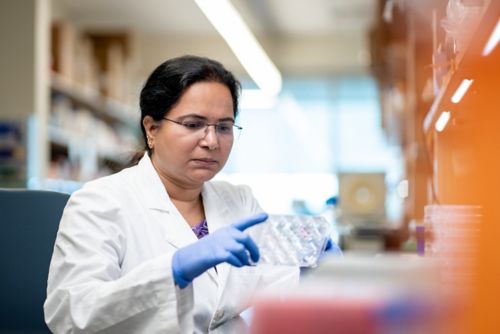
Kanneganti examining six-well plates in her lab.
Since this early work on NLRP3, my group has carried out a series of studies that helped establish the functions of innate immune and inflammasome sensors in infection, inflammatory diseases and cancer. We also discovered specific pathogens and triggers and their responding effectors and innate immune sensors as master switches in cell death pathways. These decades of observations and compelling genetic evidence led us to identify a unique inflammatory cell death pathway, PANoptosis, mediated by PANoptosomes (multifaceted macromolecular complexes that regulate PANoptosis). These studies have bridged gaps between previously siloed research areas, including microbiology, molecular biology, genetics and biochemistry, to lay the foundation for new research frontiers and the discovery of novel therapeutics. My lifelong desire to have a maximal impact has driven this work, leading me to pursue fundamental and translational research that can save lives and shape our understanding of health and disease.
2. What is the importance of mentorship, both for you when you were training as a scientist and now as you serve as a mentor to members of your laboratory?
The future of science depends on supporting the growth and development of the next generation of scientists. When I was a trainee, I was fortunate to have outstanding mentors, such as the late Michael (Mike) Mayo, PhD, Scottish Crop Research Institute, but I also saw and experienced mentors who were not able to support their trainees successfully. These experiences helped me identify the essential components of a positive mentor-mentee relationship and develop my current mentoring style.
I seek to build a supportive and nurturing environment and infrastructure in my research group that provides guidance and skillset development for my trainees to grow in their careers and research pursuits. More than 30 former lab members have become faculty members and senior industry leaders, and their successes are a source of great joy and inspiration for me.
Beyond my lab, it is also important to provide mentorship to junior faculty. I greatly enjoy meeting with peer mentees within my department and across the institution; I find these interactions highly rewarding. As a leader in science, providing mentorship across all levels is one of your primary responsibilities to support and uplift those around you.
3. What do you wish you could tell your younger self about your career in science? Is there any advice you’d give to early-career investigators considering a career in immunology?
I doubt my younger self would have imagined all the ways I would see the immunology field change through the integration of multidisciplinary research insights and new technologies. If I could tell my younger self anything about my career, I would say: Embrace diverse research areas and actively seek out new technologies and interdisciplinary opportunities whenever possible. In recent years, this has become an intentional, integral part of my research program, driving me to pursue new ideas and opportunities.
There are a couple pieces of great advice that I always try to pass along:
- No one knows everything, and that's okay. Continue learning and advancing your knowledge. This will allow you to develop informed questions and hypotheses to test. Be passionate and persevere!
- Pay attention to the details and cultivate skills to make comprehensive observations. Many important breakthroughs came from scientists making careful observations, which extend beyond simply collecting and examining data. Careful observation requires rigorous questioning and re-questioning at every step to fully consider all aspects of observed activity, forming the fundamental basis for discovery.
4. Your work focuses on the inflammatory response. What questions are you trying to answer through your research, and why are they important?
My research group is interested in understanding how the innate immune system recognizes and responds to pathogens and how genetic mutations in innate immunity affect the development of infectious, inflammatory and autoimmune diseases and cancers. My group has been in the inflammasome field since its early days; inflammasomes are multi-protein complexes that assemble in response to sensor detection of pathogen-associated molecular patterns (PAMPs) and damage-associated molecular patterns (DAMPs).
We have elucidated the function of several innate sensors and inflammasomes to establish their relevance in infection, inflammatory diseases, cancers and beyond. The more immersed we become in the field, the more we perceive cellular perturbation as a multifaceted, dynamic process that does not rely on a single sensor-PAMP/DAMP interaction. Our current priority is understanding the synergistic interactions of the numerous innate immune sensors that detect live pathogens, cancerous cells or other cellular threats.
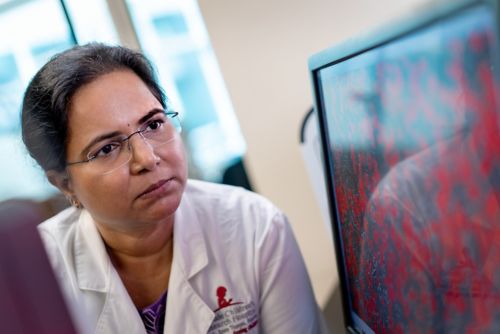
Kanneganti looking at imaging of samples.
My research group also addresses fundamental questions about innate immune sensor-induced programmed cell death pathways. Our current studies focus on gaining a mechanistic understanding of the regulation of PANoptosis, a unique, innate immune inflammatory cell death pathway driven by caspases and RIPKs and regulated by PANoptosome complexes, to identify its relevance in health and disease and develop therapeutic targeting strategies.
We aim to bridge the gap between traditionally siloed research areas of pathogens (microbiology), innate immunity and cell death. In our studies, we nurture innovation by integrating diverse research fields and constructing a guiding framework and supportive infrastructure that foster an interdisciplinary environment. We intentionally identify and fill the most critical knowledge gaps and create dedicated spaces for collaboration. To facilitate this multidisciplinary approach, we have greatly benefited from our outstanding collaborations across the institution, including with faculty in the Immunology Department and across the campus and throughout the St. Jude core facilities.
The conceptual advancements and frameworks developed in these studies have enabled us to make significant contributions to the emerging research frontier of innate immune cell death and define its implications across physiological and pathological contexts. Our work suggests that strategies targeting innate immune cell death hold immense potential for treating infections, inflammatory conditions and cancers through innovative immunotherapies. From the day I came to St. Jude, my vision was for St. Jude to become a global leader in the broad field of innate immunity and inflammation. I am happy we have reached that landmark and are forging ahead with our established framework to create new research frontiers.
5. Where do you draw inspiration as an investigator when encountering obstacles and challenges?
My key source of inspiration in life has always been my focus on having an impact, both in science and in the world. This drive leads me to push boundaries, think outside the box and break down traditional silos while seeking ways to gain fundamental insights, discover new scientific frontiers and advance translational possibilities. Challenges and obstacles are a natural part of the scientific process, and maintaining this intrinsic drive and self-motivation to overcome these obstacles is essential.
When the obstacles extend beyond scientific challenges, I often look to my colleagues and trainees as a source of inspiration; they motivate me to continue working toward policies, practices and initiatives that will support their development and enable future discoveries.
Furthermore, being at St. Jude, you never need to look far to find an inspiring patient story that reminds you why we put in all the effort. As Danny Thomas always said, “No child should die in the dawn of life.” Our institutional mission provides the ultimate inspiration to continually strive to have the most significant impact we can in fundamental and translational research to save lives.
